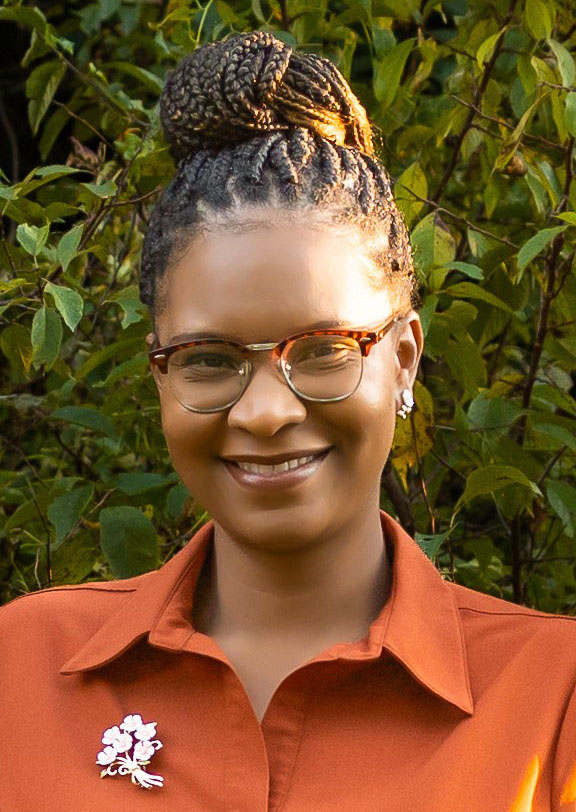Get to know Joerika Stitt, our new staff attorney on the housing team.
March 20, 2023
As a staff attorney at the Shriver Center on Poverty Law, Joerika fights for individuals who are most affected by injustice in the housing system. Joerika works to ensure people can access affordable and safe housing, can participate in decision making regarding their housing and communities, and are protected from discrimination based on their race, income source, and any other protected identity.
Joerika Stitt has spent her career advocating for vulnerable populations in social work and legal aid settings. She received her master’s in social work from the University of Illinois Urbana-Champaign and her law degree from Chicago Kent College of Law. Prior to law school, Joerika worked as a psychiatric social worker with people impacted by poverty, mental illness, and addiction.
Where did your passion for housing justice come from?

I grew up with my family in a low-income area of Chicago. My mother had a housing choice voucher, and while our neighborhood experienced its share of inequities, we always lived in safe homes because of the voucher program. When I was a kid, there was a lot of stigma associated with the housing choice voucher program, formerly known as Section 8. Because of this, I’ve always understood how important access to affordable housing is for individuals and families with low income.
You spent the first part of your career as a social worker. Why did you decide to make the switch to legal assistance work?
I love the social work profession! As a psychiatric social worker, I worked with people suffering from mental health crises and addiction. But the ongoing exposure to trauma was difficult. I got burned out but wanted to continue the mission, so I went to law school and worked in legal aid.
The work was rewarding but also emotionally taxing. So many of my clients, including children, suffered horrifying abuse and exploitation. The stories and the struggles of my clients in both professions inspired me to work toward changing the laws and policies that create and perpetuate poverty and racism.
What are some career highlights so far?
Two things come to mind. First, at the Shriver Center, I’m working on a case involving the Chicago Housing Authority’s discrimination against older adults with disabilities. We filed a lawsuit alleging that the housing authority violated federal law by tearing out grab bars in bathrooms and failing to provide reasonable accommodations in senior housing.
Second, the Shriver Center’s Housing team, along with our coalition partners, launched a statewide campaign to ensure that prospective landlords don’t discriminate against tenants based on their source of income. Over half of Illinois households earn some sort of non-wage income. In other words, this is income that comes from a source other than a job, such as housing choice vouchers or public benefits like Social Security disability. We advocated for legislation to protect these tenants that went into effect on January 1, 2023. Right now, we’re meeting with people impacted by this problem, as well as housing advocates and others to ensure they understand the new law and do what is necessary to protect tenants from housing discrimination.
Your article, Gun Violence and De Facto Segregation: Could Environmental Discrimination Be Fueling Chicago’s Soaring Gun Violence, was published in 2020 by the Wake Forest Journal of Law & Policy. What was most surprising about your findings?
I came up in the Chicago Public Schools system, where we learned about Black history once a year during Black History Month, so the research I did on housing discrimination for that article was a huge revelation. I didn’t realize that it pre-dates the Great Migration.
It was hurtful to realize how federal and local governments caused intentional harm to African-American communities all over the country through policies that involve the built environment. Here in Chicago, for example, in predominantly Black communities like Chatham and Englewood, the government used highways, bridges, and even dead-end streets to segregate and contain African-Americans.
What’s most exciting to you about your new role at Shriver?
I love working with our partners at the local and national level — organizations like Chicago Area Fair Housing Alliance, Hope Fair Housing Center, and the National Housing Law Project — to push for policies that advance racial and economic equity. We get laws passed and then work together to make sure they are properly enforced. We put teeth into these new laws so they benefit the people they are supposed to help.
Shelter is not only a basic human need, it is also critical to people’s ability to pursue and attain economic stability.
All people should have the right to a safe, stable home to build better futures for themselves and their families.
Housing is fundamental to achieving economic stability, better health outcomes, and thriving families and communities.
Our laws and policies must support people by ensuring fair work at a living wage and by providing the income supports families need to be successful.